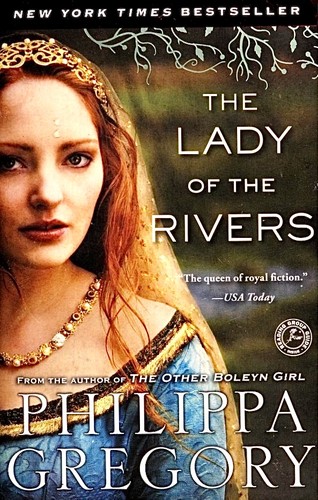443 pages
English language
Published by Simon & Schuster.

443 pages
English language
Published by Simon & Schuster.
Philippa Gregory’s third entry in her Cousins’ Wars series features an unusual character: Jacquetta Woodville, mother of Elizabeth, who in turn gave birth to the princes who disappeared mysteriously in the Tower. In THE LADY OF THE RIVERS, Ms Gregory travels further back in time, bringing us a glimpse of the seeds of the epic conflict that will be known as the War of the Roses. French-born Jacquetta first weds an older duke more interested in her supernatural gifts than her physical ones; upon his death, she defies convention to find love with his squire, whose loyalty to the crown brings them heavy responsibilities.
Through Jacquetta’s eyes, we’re given a wide-angle view of the lethal intrigues that plague the English court, where a young, weakling king is manipulated by his nobles, and accusations of witchcraft are wielded to destroy opponents. The end of the Hundred Years’ War, when England lost …
Philippa Gregory’s third entry in her Cousins’ Wars series features an unusual character: Jacquetta Woodville, mother of Elizabeth, who in turn gave birth to the princes who disappeared mysteriously in the Tower. In THE LADY OF THE RIVERS, Ms Gregory travels further back in time, bringing us a glimpse of the seeds of the epic conflict that will be known as the War of the Roses. French-born Jacquetta first weds an older duke more interested in her supernatural gifts than her physical ones; upon his death, she defies convention to find love with his squire, whose loyalty to the crown brings them heavy responsibilities.
Through Jacquetta’s eyes, we’re given a wide-angle view of the lethal intrigues that plague the English court, where a young, weakling king is manipulated by his nobles, and accusations of witchcraft are wielded to destroy opponents. The end of the Hundred Years’ War, when England lost its territories in France, offers a compelling backdrop to Jacquetta’s personal trials as she endures repeated separations from her husband and witnesses the depredations of power-hungry courtiers. When her fortunes increase with the arrival of Margaret of Anjou, a princess brought to wed the king, the novel becomes more intimate, as well.
Margaret is a compelling character who steals the show— not yet the Lancastrian virago of legend, Gregory depicts her as a brash, beautiful girl tethered to a man better suited to prayer than bed play; Margaret’s vulnerability and fallible relationship with Jacquetta bring humanity to the crowded historical events. Jacquetta’s magical gifts are underplayed except for one crucial episode; and her astounding fertility and perennial passion for her husband, as well as her keen insight, center her as a voice of reason in a complex, treacherous era.